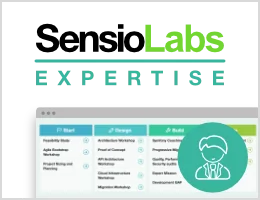How to Inject Values Based on Complex Expressions
The service container also supports an "expression" that allows you to inject very specific values into a service.
For example, suppose you have a service (not shown here), called App\Mail\MailerConfiguration,
which has a getMailerMethod() method on it. This returns a string - like sendmail
based on some configuration.
Suppose that you want to pass the result of this method as a constructor argument
to another service: App\Mailer. One way to do this is with an expression:
1 2 3 4 5 6 7 8 9 10 11
# config/services.yaml
services:
# ...
App\Mail\MailerConfiguration: ~
App\Mailer:
# the '@=' prefix is required when using expressions for arguments in YAML files
arguments: ['@=service("App\\Mail\\MailerConfiguration").getMailerMethod()']
# when using double-quoted strings, the backslash needs to be escaped twice (see https://yaml.org/spec/1.2/spec.html#id2787109)
# arguments: ["@=service('App\\\\Mail\\\\MailerConfiguration').getMailerMethod()"]1 2 3 4 5 6 7 8 9 10 11 12 13 14 15 16 17
<!-- config/services.xml -->
<?xml version="1.0" encoding="UTF-8" ?>
<container xmlns="http://symfony.com/schema/dic/services"
xmlns:xsi="http://www.w3.org/2001/XMLSchema-instance"
xsi:schemaLocation="http://symfony.com/schema/dic/services
https://symfony.com/schema/dic/services/services-1.0.xsd">
<services>
<!-- ... -->
<service id="App\Mail\MailerConfiguration"></service>
<service id="App\Mailer">
<argument type="expression">service('App\\Mail\\MailerConfiguration').getMailerMethod()</argument>
</service>
</services>
</container>1 2 3 4 5 6 7 8 9 10 11 12 13 14 15
// config/services.php
namespace Symfony\Component\DependencyInjection\Loader\Configurator;
use App\Mail\MailerConfiguration;
use App\Mailer;
return function(ContainerConfigurator $container): void {
// ...
$services->set(MailerConfiguration::class);
$services->set(Mailer::class)
// because of the escaping applied by PHP, you must add 4 backslashes for each original backslash
->args([expr("service('App\\\\Mail\\\\MailerConfiguration').getMailerMethod()")]);
};Learn more about the expression language syntax.
In this context, you have access to 3 functions:
service- Returns a given service (see the example above).
parameter-
Returns a specific parameter value (syntax is like
service). env- Returns the value of an env variable.
You also have access to the Container
via a container variable. Here's another example:
1 2 3 4 5
# config/services.yaml
services:
App\Mailer:
# the '@=' prefix is required when using expressions for arguments in YAML files
arguments: ["@=container.hasParameter('some_param') ? parameter('some_param') : 'default_value'"]1 2 3 4 5 6 7 8 9 10 11 12 13
<!-- config/services.xml -->
<?xml version="1.0" encoding="UTF-8" ?>
<container xmlns="http://symfony.com/schema/dic/services"
xmlns:xsi="http://www.w3.org/2001/XMLSchema-instance"
xsi:schemaLocation="http://symfony.com/schema/dic/services
https://symfony.com/schema/dic/services/services-1.0.xsd">
<services>
<service id="App\Mailer">
<argument type="expression">container.hasParameter('some_param') ? parameter('some_param') : 'default_value'</argument>
</service>
</services>
</container>1 2 3 4 5 6 7 8 9 10 11
// config/services.php
namespace Symfony\Component\DependencyInjection\Loader\Configurator;
use App\Mailer;
return function(ContainerConfigurator $container): void {
$services = $container->services();
$services->set(Mailer::class)
->args([expr("container.hasParameter('some_param') ? parameter('some_param') : 'default_value'")]);
};Expressions can be used in arguments, properties, as arguments with
configurator, as arguments to calls (method calls) and in
factories (service factories).

